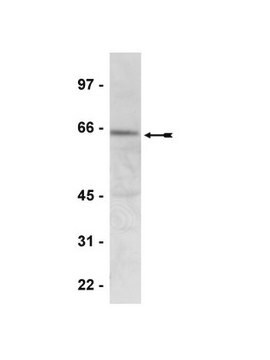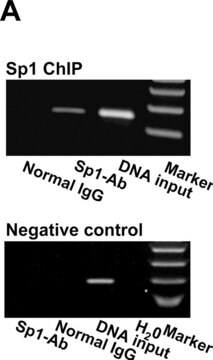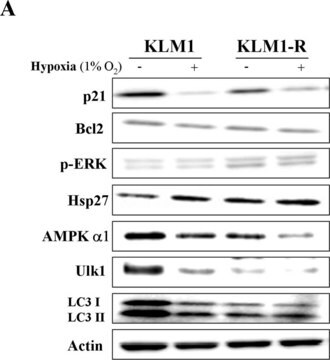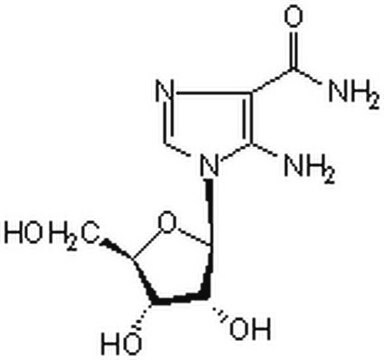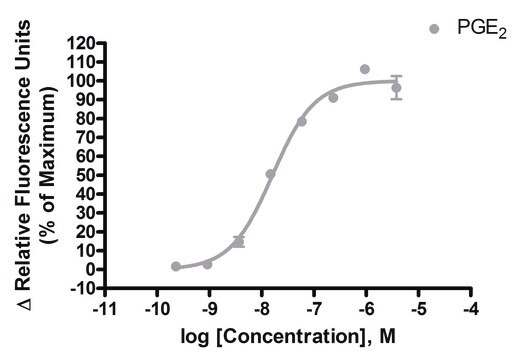HTS004RTA
Ready-to-Assay CXCR4 Chemokine Receptor Frozen Cells
Human
Sign Into View Organizational & Contract Pricing
All Photos(1)
About This Item
UNSPSC Code:
41106514
eCl@ss:
32011203
NACRES:
NA.84
Recommended Products
General description
Millipore′s Ready-to-Assay GPCR frozen cells are designed for simple, rapid calcium assays with no requirement for intensive cell culturing. Millipore has optimized the freezing conditions to provide cells with high viability and functionality post-thaw. The user simply thaws the cells and resuspends them in media, dispenses cell suspension into assay plates and, following over night recovery, assays for calcium response.
The chemokine SDF-1 and its GPCR receptor CXCR4 have a one-to-one specificity that is unique among chemokines and their receptors. SDF-1 binds to CXCR4 expressed on hematopoietic and lymphopoietic cells, and directs their trafficking to and retention in hemato-and lymphatopoietic organs and sites of inflammation (Kucia et al., 2004). CXCR4 is expressed on several tumor cell lineages, and might be responsible for metastasis to sites of SDF-1 expression, such as bone and lymph nodes (Muller et al., 2001). In addition, CXCR4 is a coreceptor for the HIV envelope glycoprotein gp120 (Feng et al., 1996). Small molecule antagonists of CXCR4 have been developed and shown to inhibit infectivity of T-tropic HIV strains and to impair growth of brain tumors (Arakaki et al., 1999; Rubin et al., 2003). Millipore′s cloned human CXCR4-expressing cell line is made in the Chem-1 host, which supports high levels of recombinant CXCR4 expression on the cell surface and contains high levels of the promiscuous G protein Gα15 to couple the receptor to the calcium signaling pathway. Thus, the cell line is an ideal tool for screening for agonists, antagonists and modulators at CXCR4.
The chemokine SDF-1 and its GPCR receptor CXCR4 have a one-to-one specificity that is unique among chemokines and their receptors. SDF-1 binds to CXCR4 expressed on hematopoietic and lymphopoietic cells, and directs their trafficking to and retention in hemato-and lymphatopoietic organs and sites of inflammation (Kucia et al., 2004). CXCR4 is expressed on several tumor cell lineages, and might be responsible for metastasis to sites of SDF-1 expression, such as bone and lymph nodes (Muller et al., 2001). In addition, CXCR4 is a coreceptor for the HIV envelope glycoprotein gp120 (Feng et al., 1996). Small molecule antagonists of CXCR4 have been developed and shown to inhibit infectivity of T-tropic HIV strains and to impair growth of brain tumors (Arakaki et al., 1999; Rubin et al., 2003). Millipore′s cloned human CXCR4-expressing cell line is made in the Chem-1 host, which supports high levels of recombinant CXCR4 expression on the cell surface and contains high levels of the promiscuous G protein Gα15 to couple the receptor to the calcium signaling pathway. Thus, the cell line is an ideal tool for screening for agonists, antagonists and modulators at CXCR4.
Cell Line Description
- GPCR Cell Lines
- Host cells: Chem-1
Application
Ready-to-Assay Human CXCR4 GPCR frozen cells for Calcium Flux FLIPR Assays.
Biochem/physiol Actions
- GPCR Class: A
- Protein Target: CXCR4
- Target Sub-Family: Chemokine
Components
Pack contains 2 vials of mycoplasma-free cells, 1 ml per vial.
Fifty (50) mL of Media Component.
Fifty (50) mL of Media Component.
Disclaimer
This product contains genetically modified organisms (GMO).
Within the EU GMOs are regulated by Directives 2001/18/EC and 2009/41/EC of the European Parliament and of the Council and their national implementation in the member States respectively.
Storage Class Code
10 - Combustible liquids
WGK
WGK 1
Flash Point(F)
Not applicable
Flash Point(C)
Not applicable
Certificates of Analysis (COA)
Search for Certificates of Analysis (COA) by entering the products Lot/Batch Number. Lot and Batch Numbers can be found on a product’s label following the words ‘Lot’ or ‘Batch’.
Already Own This Product?
Find documentation for the products that you have recently purchased in the Document Library.
Our team of scientists has experience in all areas of research including Life Science, Material Science, Chemical Synthesis, Chromatography, Analytical and many others.
Contact Technical Service